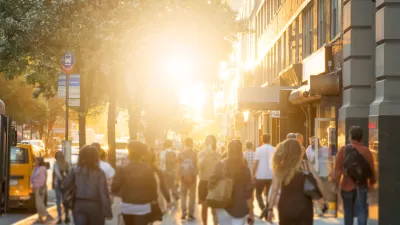This piece from The Freeman looks at the debate over sprawl and whether free market economics encourage it or offer a solution.
"The exchanges focus mainly on zoning rather than other interventions that have been identified over the years as factors that abet sprawl. These include federal subsidies to construct the 46,876-mile-long interstate highway system and intra-urban freeway systems, both of which have made living in the less-expensive fringes of cities cheaper for urban commuters - not to mention federal subsidies for the construction of water mains, sewers, telecommunication lines, and, as we all should be well aware of today, direct and indirect subsidies to single-family home ownership via Fannie Mae, Freddie Mac, and a slew of federal policies intended to promote single-family home ownership, dating back to the Great Depression, including the income-tax deduction for mortgage interest."
The article suggests briefly that the demand curve for sprawl goes down over time, though that assertion is not fully explained.
FULL STORY: The Demand Curve for Sprawl Slopes Downward

Planetizen Federal Action Tracker
A weekly monitor of how Trump’s orders and actions are impacting planners and planning in America.

Map: Where Senate Republicans Want to Sell Your Public Lands
For public land advocates, the Senate Republicans’ proposal to sell millions of acres of public land in the West is “the biggest fight of their careers.”

Restaurant Patios Were a Pandemic Win — Why Were They so Hard to Keep?
Social distancing requirements and changes in travel patterns prompted cities to pilot new uses for street and sidewalk space. Then it got complicated.

Platform Pilsner: Vancouver Transit Agency Releases... a Beer?
TransLink will receive a portion of every sale of the four-pack.

Toronto Weighs Cheaper Transit, Parking Hikes for Major Events
Special event rates would take effect during large festivals, sports games and concerts to ‘discourage driving, manage congestion and free up space for transit.”

Berlin to Consider Car-Free Zone Larger Than Manhattan
The area bound by the 22-mile Ringbahn would still allow 12 uses of a private automobile per year per person, and several other exemptions.
Urban Design for Planners 1: Software Tools
This six-course series explores essential urban design concepts using open source software and equips planners with the tools they need to participate fully in the urban design process.
Planning for Universal Design
Learn the tools for implementing Universal Design in planning regulations.
Heyer Gruel & Associates PA
JM Goldson LLC
Custer County Colorado
City of Camden Redevelopment Agency
City of Astoria
Transportation Research & Education Center (TREC) at Portland State University
Camden Redevelopment Agency
City of Claremont
Municipality of Princeton (NJ)





























